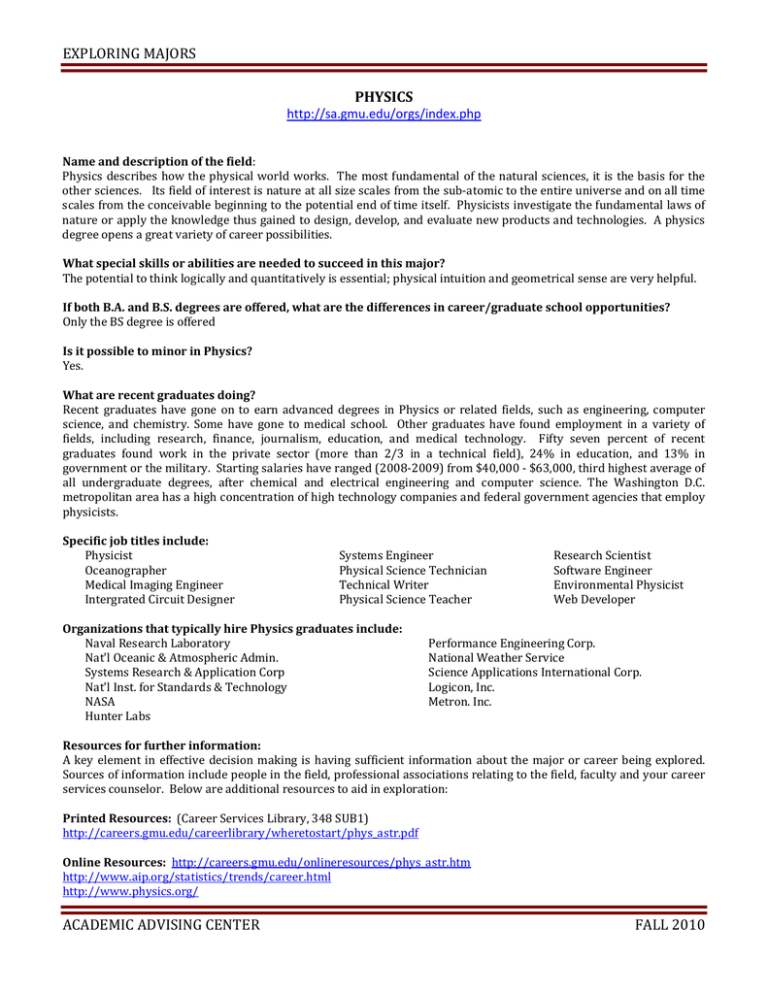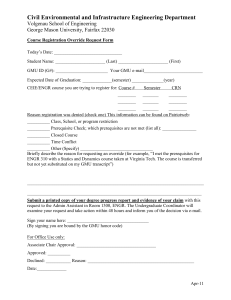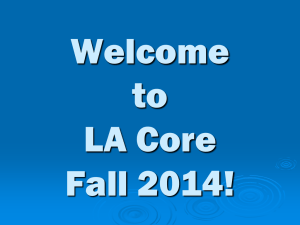exploring majors - Academic Advising
advertisement

EXPLORING MAJORS PHYSICS http://sa.gmu.edu/orgs/index.php Name and description of the field: Physics describes how the physical world works. The most fundamental of the natural sciences, it is the basis for the other sciences. Its field of interest is nature at all size scales from the sub-atomic to the entire universe and on all time scales from the conceivable beginning to the potential end of time itself. Physicists investigate the fundamental laws of nature or apply the knowledge thus gained to design, develop, and evaluate new products and technologies. A physics degree opens a great variety of career possibilities. What special skills or abilities are needed to succeed in this major? The potential to think logically and quantitatively is essential; physical intuition and geometrical sense are very helpful. If both B.A. and B.S. degrees are offered, what are the differences in career/graduate school opportunities? Only the BS degree is offered Is it possible to minor in Physics? Yes. What are recent graduates doing? Recent graduates have gone on to earn advanced degrees in Physics or related fields, such as engineering, computer science, and chemistry. Some have gone to medical school. Other graduates have found employment in a variety of fields, including research, finance, journalism, education, and medical technology. Fifty seven percent of recent graduates found work in the private sector (more than 2/3 in a technical field), 24% in education, and 13% in government or the military. Starting salaries have ranged (2008-2009) from $40,000 - $63,000, third highest average of all undergraduate degrees, after chemical and electrical engineering and computer science. The Washington D.C. metropolitan area has a high concentration of high technology companies and federal government agencies that employ physicists. Specific job titles include: Physicist Oceanographer Medical Imaging Engineer Intergrated Circuit Designer Systems Engineer Physical Science Technician Technical Writer Physical Science Teacher Organizations that typically hire Physics graduates include: Naval Research Laboratory Nat'l Oceanic & Atmospheric Admin. Systems Research & Application Corp Nat'l Inst. for Standards & Technology NASA Hunter Labs Research Scientist Software Engineer Environmental Physicist Web Developer Performance Engineering Corp. National Weather Service Science Applications International Corp. Logicon, Inc. Metron. Inc. Resources for further information: A key element in effective decision making is having sufficient information about the major or career being explored. Sources of information include people in the field, professional associations relating to the field, faculty and your career services counselor. Below are additional resources to aid in exploration: Printed Resources: (Career Services Library, 348 SUB1) http://careers.gmu.edu/careerlibrary/wheretostart/phys_astr.pdf Online Resources: http://careers.gmu.edu/onlineresources/phys_astr.htm http://www.aip.org/statistics/trends/career.html http://www.physics.org/ ACADEMIC ADVISING CENTER FALL 2010 EXPLORING MAJORS Science Related Job/Internship Postings: http://cos.gmu.edu/students/careerservices http://www.aaas.org/careercenter/ http://www.aps.org/careers/ http://www.physics.gmu.edu/wiki/Links:Undergraduate_Research Networking Resource: http://www.mentornet.net/ Professional Associations: • American Association for the Advancement of Science– http://www.aaas.org/ • American Astronomical Society - http://www.aas.org • American Institute of Physics - http://www.aip.org/ • Mason Student Clubs/Orgs/Societies Science and Technology Umbrella – http://sa.gmu.edu/orgs/index.php http://www.physics.gmu.edu/wiki/Clubs:Physics_Club Contacts for further information: Philip Rubin Department of Physics & Astronomy 359 Science & Tech. Building I 703-993-3185 prubin@gmu.edu ACADEMIC ADVISING CENTER Academic Advising Center 304 SUB I 703-993-2470 Gemma Scallon Costa Career Services N. Chesapeake – Fall 2010 348 SUB I – Spring 2011 703-993-2370 gcosta@gmu.edu FALL 2010


